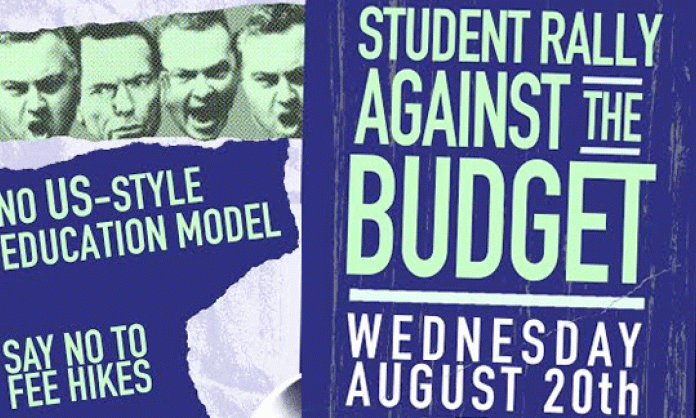The Abbott government is on a mission to restructure fundamentally the university system. It wants it to look and feel just like the US education system. It wants it to become a sanctuary of free market profiteering, a playground for the children of the elite and a lifelong debt sentence for the majority of students.
A recent study of the US system by Black Book Market Research found that 94 percent of working university graduates find their student loan payments unmanageable. This is what’s in store for Australian students if education minister Christopher Pyne’s education package is passed by parliament.
Crunch time is rapidly approaching. The government will try to ram its education changes through the Senate in the parliamentary sitting that begins on 26 August. If we want to stop it, now is the time to make our opposition felt.
When the Liberals first proposed these attacks in the May federal budget, they were confident that they were on a winner. Despite the attacks being far-reaching, they are also a continuation of successive Labor and Liberal government policies over the past three decades.
But high profile student protests around the country have set this agenda back and have created the possibility of inflicting a major defeat on the Abbott government. Our protests have involved thousands of students, have received abundant media coverage, have significantly influenced public opinion (deregulation of fees has gone from being one of the least opposed measures in the budget to one of the most opposed) and have resulted in all of the opposition parties and politicians pledging to vote down the budget cuts in the Senate.
This is an important development, but it’s by no means the end of the road. Pyne is frantically wining and dining crossbenchers in an effort to get the numbers to pass his legislation.
He has a reasonable chance of succeeding. The Palmer United Party senators, who may well cast the decisive votes, are an assortment of right wing politicians loosely grouped around coal baron Clive Palmer, who in turn has only a loose position of supporting free education and opposing the deregulation of fees. Ricky Muir and Nick Xenophon are similarly unreliable allies of students.
Then there’s the Labor Party. It is mouthing anti-government rhetoric, but students should take it with a grain of salt. When in government, Labor initiated the deregulation process; it initiated $2.3 billion worth of funding cuts and gave individual universities greater scope to determine enrolment numbers. These two measures provided the foundation for the current proposal to let universities charge whatever they want for their courses.
If you want to see what that might mean, look no further than Bond University in Queensland, which already charges its own fees. A bachelor of arts costs $97,584. A bachelor of medicine costs more than $330,000.
Labor recently helped vote down a bill containing $435 million of cuts, not because it suddenly discovered kindness or abandoned its commitment to an increasingly privatised and user-pays system, but because the student protest campaign has made it fearful of a public backlash.
The Greens are the only players in the Senate who have shown some consistency in opposing attacks on education, but they don’t have the numbers.
Pressure from below has created the possibility of defeating these attacks. We need to maintain this pressure if we are going to make sure that happens.
The National Union of Students has called a national day of action for Wednesday, 20 August. There will be protests in cities across Australia.
On that day, the echo of angry students on the streets needs to resonate through the halls of parliament. If you’ve ever thought of coming to a student protest, this is the one not to miss.
------------
Melbourne – 2pm State Library of Victoria
Sydney – 2:30pm UTS Tower
Newcastle – 2pm City Hub, University of Newcastle
Brisbane – 2pm Queens Park
Perth – 2pm Forrest Chase, Perth CBD
Adelaide – 2pm Parliament House
Canberra – 2pm Union Courth, Australian National University









